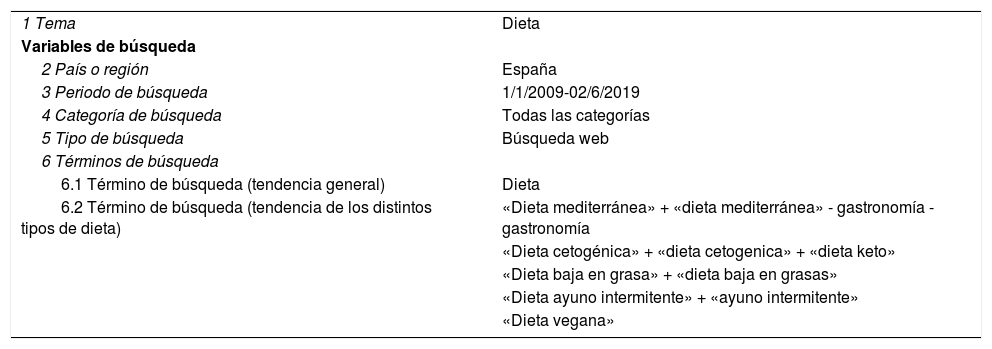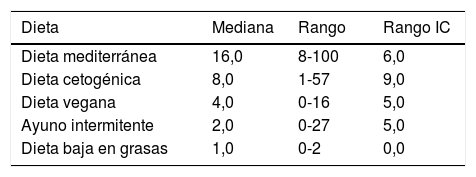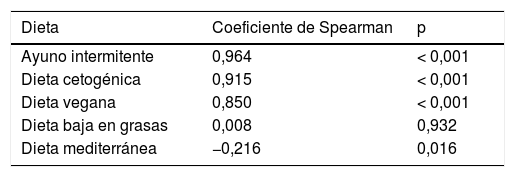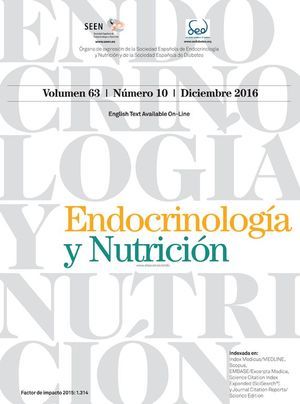Explorar a través Google Trends las tendencias del interés de la población española sobre información relacionada con diferentes tipos de dietas, focalizadas en las más populares y con estudios de evidencia, a lo largo de los últimos 10años.
Material y métodoSe analizaron las tendencias de búsqueda de los términos «dieta mediterránea», «dieta cetogénica», «dieta baja en grasas», «ayuno intermitente» y «dieta vegana». El volumen relativo de búsqueda (VRB) de cada término fue comparado. La dirección de la tendencia se estudió mediante la correlación de Spearman (CS).
ResultadosEl término «dieta mediterránea» fue el más buscado, con una mediana de VRB de 16 (rango intercuartil [RI] 6; rango 8-100), aunque siguió una tendencia cronológica decreciente (CS=−0,216). Le siguieron «dieta cetogénica», con VRB de 8 (RI 9; rango 1-57); «dieta vegana», con VRB de 4 (RI 5; rango 0-16); «ayuno intermitente», con VRB de 2 (RI 5; rango 0-27), y «dieta baja en grasas», con VRB de 1,16 (RI 0; rango 0-2). El término con mejor correlación a lo largo del tiempo fue «ayuno intermitente» (CS=0,96), seguido de «dieta cetogénica» (CS=0,91) y «dieta vegana» (CS=0,85).
ConclusiónEn España, el interés de la población sobre la información acerca de la dieta mediterránea es mayor que para otras dietas. Sin embargo, en los últimos años se ha producido un incremento progresivo en el interés, medido como VRB, en otras dietas, como la dieta cetogénica, la dieta vegana o el ayuno intermitente, y se ha producido una reducción en el interés por la dieta mediterránea. La dieta baja en grasas no genera interés en la población española.
To use Google Trends to explore the trends of interest of the Spanish population regarding information related to different types of diets, focused on those that are popular and with evidence-based studies, over the last 10years.
Material and methodsThe search trends referred to the terms «Mediterranean diet», «ketogenic diet», «low fat diet», «intermittent fasting» and «vegan diet» were analyzed. The relative search volumes (RSV) of the terms were compared. The direction of the trend was studied using the Spearman's correlation coefficient (SC).
Results«Mediterranean diet» was the most widely searched term, with a median RSV of 16 (interquartile range [IQR] 6; range 8-100), though it exhibited a decreasing chronological trend (SC=−0.216). It was followed by «ketogenic diet», with an RSV of 8 (IQR 9; range 1-57); «vegan diet», with an RSV of 4 (IQR 5; range 0-16); «intermittent fasting», with an RSV of 2 (IQR 5; range 0-27), and «low fat diet», with an RSV of 1.16 (IQR 0; range 0-2). The term with the best correlation over time was «intermittent fasting» (SC=0.96), followed by «ketogenic diet» (SC=0.91) and «vegan diet» (SC=0.85).
ConclusionsIn Spain, the interest of the population in information about the Mediterranean diet is greater than for other diets. However, in recent years there has been a progressive increase in interest (measured as RSV) in other diets such as the ketogenic diet, vegan diet or intermittent fasting, and there has been a decrease in interest in the Mediterranean diet. The low fat diet does not generate interest in the Spanish population.
Artículo
Comprando el artículo el PDF del mismo podrá ser descargado
Precio 19,34 €
Comprar ahora












